ubuntu

I LIVE IN Rwanda, a beautiful East African country also called the Land of a Thousand Hills. We have a saying here: “When you are well, you belong to yourself, but when you are sick, you belong to your family.” But my first trip to the United States taught me that culture matters, particularly in the context of end-of-life care.
In a palliative care education and practice course at Harvard Medical School, I learned the principle of patient autonomy — that individuals have the ultimate authority to make decisions about their own health care. Patients are “in control.” But while shadowing my mentor at Massachusetts General Hospital, I noticed photos of family members in patients’ rooms. I remember asking, “Where are the people who are shown in the photographs?” I now know that this may be an attempt to recreate a family or to provide a last chance to reconnect with life, but all the people I saw in the pictures were alive — why were people trying to create an illusion of family when the family exists?
I asked my mentor, “How can we bring back those people from the photos to the room?”
Of course, I came with my bias and an African perspective on end-of-life care. Here, decision-making is based on patient autonomy and community responsibility, because one aspect does not exclude the other. There is synergy between them.
In Rwanda, there are no photos in the patient’s room. Instead, there are people.
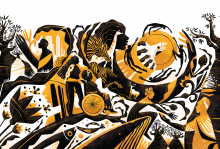
In a real sense all life is interrelated. All [people] are caught in an inescapable network of mutuality, tied in a single garment of destiny. Whatever affects one directly, affects all indirectly. I can never be what I ought to be until you are what you ought to be, and you can never be what you ought to be until I am what I ought to be. ... This is the interrelated structure of reality. —Martin Luther King Jr.
WHEN I STUDIED abroad in South Africa in 1996, I learned much about the power of interdependence and mutuality. There I encountered and experienced the southern-African philosophy of ubuntu. Through Nelson Mandela’s moral leadership and embodiment of ubuntu, the nation was led through transformational change. Like Dr. King, Mandela refused to hate his enemies, including those who kept him imprisoned for 27 years, as he envisioned a future South Africa that included Black and white together.
Archbishop Desmond Tutu summarized ubuntu in what became a marker of both a movement and a philosophy: “I am because we are.” Mpyana Fulgence Nyengele, author of Cultivating Ubuntu, offers this definition: “Ubuntu is the substance and core being of a person and speaks particularly about the fact that we cannot be fully formed as human beings in isolation.” Rather, as Stephen Lewis, Matthew Wesley Williams, and Dori Baker share in Another Way, Nyengele explains that “it is only through our communal participation and interaction with other people that we begin to develop trust, compassion, caring, humility, kindness, and forgiveness, which are all qualities of what it means to be human and humane toward others. Similar to the fruit of the spirit, ubuntu is possible because ntu or Spirit ‘orients persons toward life-giving choices, actions and behaviors.’ ... Therefore, ‘ubuntu promotes and enhances the abundance of human life in community and beyond.’”
I think of ubuntu as an expanded, vivid version of the Golden Rule: We are called to do unto others as we would have them do unto us. Or, as King so often put it, we are to be “our brothers’ and sisters’ keeper.”
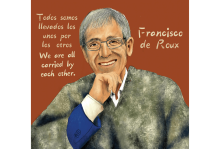
AS WE WORKED on the three feature articles in this issue, a common theme became clear: Each of the authors, in distinctive ways and from varied points of view, was grappling with related questions: How do we take the next steps in constructing a more just church and society? What models can help guide us as we go about the work of building something new?
In an excerpt from his new book A More Perfect Union, Sojourners President Adam Russell Taylor looks to the southern African philosophy of ubuntu—interdependence—as offering wisdom that goes far beyond one-on-one relationships to a paragon for society itself. Colleen Murphy, a law professor in Illinois and an expert in issues of transitional justice, explains why making progress on racial justice requires facing the hard realities of our past. And associate editor Christina Colón talked with pastors about how their churches will be different as they enter the post-quarantine era. In their own unique ways, each author is wrestling—as all of us are called to do—with questions of what it means to put our faith into action in an uncertain world.
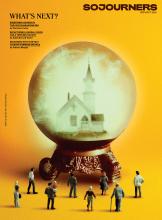
Taking the next steps in constructing a more just church and society.
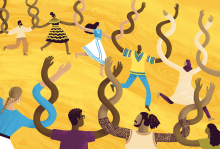
EACH OF THESE reflections was written separately, not taking the others into consideration while writing each one. But as I reread them, there is a thread here. It is the thread of what it means to live faithfully together; what it means to do right by one another. Reflecting on love, accountability, economic justice, and what it means to have a righteous mind, I found myself thinking of each text in communal ways, rather than the ways I confess to typically having thought of them: “What do they mean for me, the individual?”
I am more struck by the selfishness I see, in these extraordinary times, when some people flat out refuse to do anything that they believe infringes on their individual rights. I believe that as followers of Jesus we are charged—called—to go beyond ourselves, even if we are socialized differently in our cultures or families. In addition, it is easy to settle into devotions that do not look beyond our own spiritual growth. But in these reflections, I have pushed myself to think about what it means to take in a larger view, to extend personal spiritual growth into the community. In some ways I am trying to reflect the Zulu concept of ubuntu, which indicates that a person is only human in relation to other humans. For me, by necessity, that means we must reach beyond ourselves. I hope these reflections will take you to that kind of humanity which, I believe, will deepen your faith in Christ.
September 6
The Love Debt
Exodus 12:1-14; Psalm 149; Romans 13:8-14; Matthew 18:15-20
“LOVE” IS A landmine word. It has come to mean expressions of sappy, gooey sentimentality. Because of this expectation, requiring the hard “verb” of love as a Christian commitment often gets dismissed. “Owe no one anything, except to love one another, for the one who loves another has fulfilled the law” (Romans 13:8). Every bit of the Romans text requires something more than good feelings. It calls us to examine our Christian debt. To “do no wrong” in a world where wrong stalks so many means we have to figure out how to “right the wrong.” What can it mean to “owe no one anything but love” when this nation robbed Indigenous Peoples of land and livelihood? It would be easy to say, “That was so long ago,” except the effects of that robbery extend into our present time.
It’s easy enough to name the damage, but how do we repair it? What does it mean to say, “Love does no wrong to a neighbor” (verse 10), when our trans siblings are being murdered and dismembered (as in the case of Dominique Fells in Philadelphia)? How do we provide safety? What does “Love your neighbor as yourself” (verse 9) mean in this Black Lives Matter moment of our culture, as we grapple with centuries-old sin against Black humanity? If we in fact owe one another love, then we owe one another justice, which includes repairing the damages done, individually and collectively, in community. It literally means reparation. It means doing so with an urgency, if we in fact believe “salvation is nearer to us now than when we became believers” (verse 11). For some, longing for Christ’s return can be an invitation to ignore the pain of now; but for me, it is the exact opposite. We are called to live honorably, which means to love righteously by “putting Christ on” (verse 14) and being the active love of God in the world by our deeds. Otherwise, it is not love.

In the years since, the predominant narrative of the TRC making great strides to heal apartheid has been re-examined. In focus group interviews with victims, analysis of the victims’ transcripts, and amnesty hearings, University of Connecticut researcher Audrey Chapman found a disparity between the goals of the TRC and of the South African people.

An annual “snow bird” sojourn to South Africa was convicting. The constant news highlighted the American political “silly season” along with the drumbeat reports of President Jacob Zuma’s illegal brutish behavior. An African storekeeper exclaimed, “Do Republicans not see the Trump antics are undermining the good feelings we have because of President Obama’s accomplishments? We are afraid for all of us.”
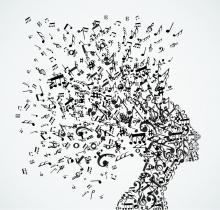
I am waiting for the music to return — the sonorous graces of laughter and kitchen clinking, of bird call on the hillside.
I am waiting for the music to return — the precarious arrangement of hope and memory that uplifts and guides.
I am waiting for the music to return — the band, the orchestra, the seisiún, the jam, the people who make and craft sound.
Instead, I am stranded in an eschatological posture like pause on my mp3 player. The Wifi Spirit does not respond and even if I could connect, the playlist I have randomized is sore lacking. I miss the people who make these sounds. I miss their voices.
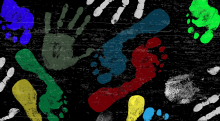
What better way to honor Nelson Mandela on his 95th birthday today than to reflect on his concept of Ubuntu? Ubuntu, a word from the Bantu languages of southern Africa — roughly translated “I am because we are” — sums up Mandela’s approach to leadership, incorporating a generous spirit and concern for the wellbeing of one’s community.

Will native son and national hero Nelson Mandela survive his latest bout with illness? That is the single question dominating headlines, speeches, twitter, and conversation throughout South Africa.
It’s an unusual situation in a country where death is an off-limits topic due to local culture. But as locals brace themselves, anxious, and hopeful, they remain stoic and protective, insisting on Mandela’s privacy as he battles a lung infection. And they say he has a right to be left alone.
“This is a man who gave so much of himself to this country,” said Roseline Wilson, 30, an insurance company representative in Johannesburg. “He must rest. He has suffered too much in his old age.”
Art and iconography — both ancient and modern — from Ethiopian Orthodoxy (also known as Tawahedo or "being made one" in the Ge'ez language that remains the official language of the Orthodox liturgy here) were ever-present — in shops, restaurants, and hotel lobbies as well as in the myriad churches and monasteries, and the sounds of ancient Christian prayers and the chants of monks filled the air from the capital city of Addis Ababa to the kebeles (or neighborhoods) on the outskirts of Bahir Dar, another major city about 60 km from the Sudanese border.
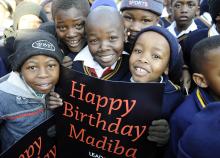
Back in 2005, Africa was a recurring theme of U2's worldwide Vertigo tour, where Bono’s campaigning for debt relief, trade justice and immediate intervention in the AIDS pandemic — each fueled by his following of Jesus — met in his music in indelibly powerful collision of faith, justice, and art.
When Bono and his bandmates played “Where The Streets Have No Name,” the most amazing mass of colors dropped from the rafters as millions of Willie Williams-designed, light bulbs descended from the rafters to form stage’s back drop and a modern-mosaic high-tech screen. Then came the flags of each African nation in the most moving light show I’ve ever seen.
During the razzle-dazzle on stage, Bono made his claim,
“From the swamp lands of Louisiana to the high hills of Kilimanjaro, from the bridge at Selma to the mouth of the Nile…AFRICA…AFRICA…AFRICA…the
journey of equality moves on, moves on…AFRICA…from town centers to townships…sacred ground, proving ground…”
The link between the Martin Luther King Jr. (the Doctor of the Deep South of America’s inequality) to Desmond Tutu and Nelson Mandela (the Archbishop and President of Africa’s inequality) was particularly potent art.
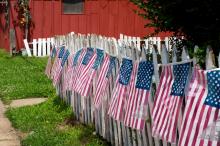
What is Ubuntu? The principle of Ubuntu was birthed in Africa and there is no direct translation of the word into English. Archbishop Desmond Tutu summarizes it well:
“You know when it is there, and it is obvious when it is absent. It has to do with what it means to be truly human, it refers to gentleness, to compassion, to hospitality, to openness to others, to vulnerability, to be available for others and to know that you are bound up with them in the bundle of life, for a person is only a person through other persons.”
The observations of my life thus far have led me to conclude that it is popular to argue for the advancement of the individual.
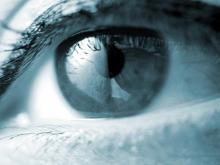
I've been navel gazing again and wondering how we come to know ourselves. I wonder what that right balance is between our inner-barometer of self-knowing and that external one that people reflect back to us. "Ubuntu," (I am because of who we are) or all the various "I am..." statements: "I think therefore I am" (Descartes) or "I am what I am and that's all that I am" (Popeye)...What statements might we add to this list? Bishop Desmond Tutu expands the notion of Ubuntu thusly:
One of the sayings in our country is Ubuntu – the essence of being human. Ubuntu speaks particularly about the fact that you can't exist as a human being in isolation. It speaks about our interconnectedness. You can't be human all by yourself, and when you have this quality – Ubuntu – you are known for your generosity. We think of ourselves far too frequently as just individuals, separated from one another, whereas you are connected and what you do affects the whole World. When you do well, it spreads out; it is for the whole of humanity.
I'm trying to wrap my mind about how we construct the self. Judith Butler, Catherine Bell (ritualization) and others inhabit my mind lately. Ritual, tradition, story, identity... the list goes on and on ...